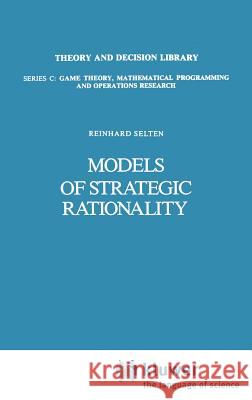Models of Strategic Rationality » książka
Models of Strategic Rationality
ISBN-13: 9789027726636 / Angielski / Twarda / 1988 / 318 str.
The papers collected in this volume relate to game theory. They aim at the elaboration and discussion of basic con- cepts, at the analysis of specific applied models and at the evaluation of experimental evidence. A game is a mathematical model of a situation where several actors with different goals are engaged in strategic inter- action. Game theory explores the nature and the consequence. s of rational behavior in games. With respect to several papers in this volume, it seems to be appropriate to comment on later developments. A list of some important references is given at the end of the intro- duction. References already included in the collected pa- pers are not repeated here. In casual conversation colleagues sometimes observe that the author on the one hand goes to extremes in the elabora- tion of the consequences of Bayesian rationality and on the other hand strongly emphasizes the limited rationality of actual decision behavior. This seeming discrepancy is also expressed in the collection presented here. The author thinks that a sharp distinction should be made between nor- ative and descriptive game theory. This position of "methodological dualism" has been expressed in a comment to Aumann's paper "What is game theory trying to accomplish?" (Aumann, 1985, Selten 1985) Normative game theory has the important task to explore the nature and the consequences of idealized full rationality in strategic interaction. This requires a thorough discuss- ion of first principles. Empirical arguments are irrelevant here.











